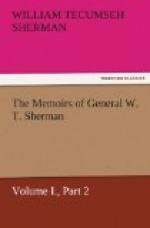On the 11th of October, 1861, the writer, who had been personally on mustering duty in Indiana, was appointed a brigadier-general of volunteers, and ordered to report to General Sherman, then in command of the Department of the Cumberland, with his headquarters at Louisville, having succeeded General Robert Anderson. When the writer was about leaving Indianapolis to proceed to Louisville, Mr. Cameron, returning from his famous visit of inspection to General Fremont’s department, at St. Louis, Missouri, arrived at Indianapolis, and announced his intention to visit General Sherman.
The writer was invited to accompany the party to Louisville. Taking the early morning train from Indianapolis to Louisville on the 16th of October, 1861, the party arrived in Jeffersonville shortly after mid-day. General Sherman met the party in Jeffersonville, and accompanied it to the Galt House, in Louisville, the hotel at which he was stopping.
During the afternoon General Sherman informed the writer that a council of war was to be held immediately in his private room in the hotel, and desired him to be present at the council. General Sherman and the writer proceeded directly to the room. The writer entered the room first, and observed in it Mr. Cameron, Adjutant-General L. Thomas, and some other persons, all of whose names he did not know, but whom he recognized as being of Mr. Cameron’s party. The name of one of the party the writer had learned, which he remembers as Wilkinson, or Wilkerson, and who he understood was a writer for the New York Tribune newspaper. The Hon. James Guthrie was also in the room, having been invited, on account of his eminent position as a citizen of Kentucky, his high civic reputation, and his well-known devotion to the Union, to meet the Secretary of War in the council. When General Sherman entered the room he closed the door, and turned the key in the lock.
Before entering on the business of the meeting, General Sherman remarked substantially: “Mr. Cameron, we have met here to discuss matters and interchange views which should be known only by persons high in the confidence of the Government. There are persons present whom I do not know, and I desire to know, before opening the business of the council, whether they are persons who may be properly allowed to hear the views which I have to submit to you.” Mr. Cameron replied, with some little testiness of manner, that the persons referred to belonged to his party, and there was no objection to their knowing whatever might be communicated to him.
Certainly the legitimate and natural conclusion from this remark of Mr. Cameron’s was that whatever views might be submitted by General Sherman would be considered under the protection of the seal of secrecy, and would not be divulged to the public till all apprehension of injurious consequences from such disclosure had passed. And it may be remarked, further, that justice to General Sherman required that if, at any future time, his conclusions as to the amount of force necessary to conduct the operations committed to his charge should be made public, the grounds on which his conclusions were based should be made public at the same time.




